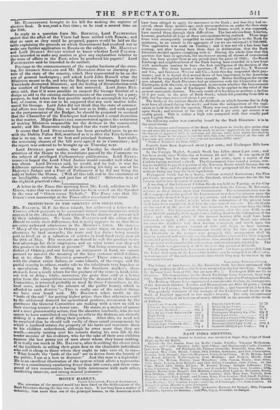DESTITUTION IN TIM ORKNEYS AND SHETLAND.
MR. BALFOUR, M. P. for these islands, has addressed a letter to the Cour r, which purports to be a coot indict ion of some sta ts which appeared in the Aberdeen Herald relative to the distress at present kit by their inhabitants. We leave Mr. liALroun :Lod the editor of the Herald to settle their differences, but it reafly appears to us that there are some awkward admissions in the Member's letter. Ile states_ " Many of the ptoperties in (Miley are innler trust, or managed ft or absentees by land stewards ; the rents and fen duties being usually paid in kind, or at a valuation of articles in kind fixed every year on the 20t11 of 3lay. The stewards are bound to sell the produce to the best advantage for their employers, aud out what terms can they sell this produce in the district at present ?" Not being conversant in the dialect of Orkney, and not having an interpreter at hand, we eanuot pretend to unravel the meaning of the long sentence which follows, but at its close Mr. BALFOUR proceeds—" These cans( s, together with the almost entire failure, in some islands, of the crops, and the partial scarcity in others, render sale to the inhabitants very hopeless as a speculation. But, by sending to the Southern inarkets, these stewards have a ready return for the produce of the rents in kind, with- out risk or delay ; while, moreover, the grain thus sold lit it better price from the competition occasioned by the demands of the General Committee, is returned probably in meal by those Committees to the local ones, reduced by the amount of the public bounty which is afforded to each district."—This is really one of the coolest things- we have ever heard said. Mr. Baseora takes credit to the "lords of the soil" for getting higher prices than they otherwise could by the additional demand for agricultural produce, occasioned by the purchases the General Committee are making with a view to sell to their starving tenants at a lower rate. He states, as a matter of course and a most praiseworthy action, that the absentee lundlords, who do not appear to have contributed any thing to relieve the distress, are cleverly making it a means of filling their pockets. After this, we need not be surprised that he should talk coolly of those entail arrangements by Which a landlord retains the property of his lands and transmits them to his children unburdened, although he owes more than they are worth,—merely turning over his tenants during his own life to the tender mercies of his creditors, who for the sake of their own children squeeze the last penny out of men about whom they know nothing. It is really too much in Mr. BALFOUR, after describing the clever trick of the landlords in selling their grain dear to the charitable individuals who sell it cheap to those whom they ought to take care of, to say- " What benefit the 'lords of the soil' are to derive from the bounty of the public, I am at a loss to discover." And this man is a legislator ! Ile is an excellent illustration of' the system which allots a representa- tive to a constituency numbering fewer than WO voters, and these com- posed of two communities having little intercourse with each other, conflicting interests, and strong mutual jealousies.


























 Previous page
Previous page